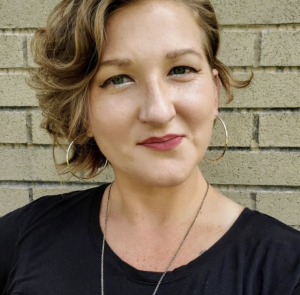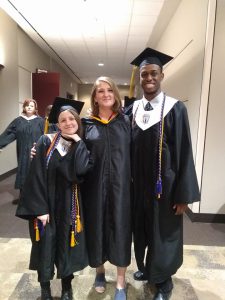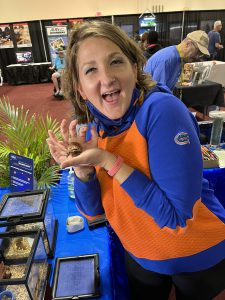Q. You love teaching, and you love biological control. What brought you to the point of pursuing a Ph.D. in entomology?

A. I’ve wanted to pursue my Ph.D. since getting my master’s in Entomology in 2012. I don’t think I ever intended to teach high school as long as I did, but I’m so fortunate to have learned the things I did during that time. I think it has made me both a better scientist and a science communicator. I’m lucky to have had the opportunity to return to graduate school with Dr. Minteer.
Q. Before you arrived at IRREC, you taught high school and enjoyed your work. What did you like most about teaching children?

A. The school I worked at for the longest took a “whole child” approach to education. We were a very small school that focused on teaching subject material and addressed their social-emotional needs. We really worked to create as safe an environment for children as possible. Getting to know students and watching them grow up into these incredible people with diverse interests and successes has been the highlight of my career. There is no instant gratification in education, but it is the most fulfilling and rewarding thing I’ve ever done.
Q: You are about to graduate with a Ph.D. in Entomology and have accepted a position as an academic professional at the University of Georgia. What are your plans as you segue into a new journey?

A. I am taking a faculty position at the University of Georgia as the undergraduate coordinator for the entomology department. Finishing the dissertation is the bulk of what needs to be done, but I know once I get there, I will need to really take the time to get to know the students in the department. Creating a safe community starts with just getting to know the students.
Q. We have enjoyed your tenure as a graduate student at IRREC. What are some of the highest points you remember from your work here?
A. COVID definitely threw a monkey wrench into all of our plans, but I have really enjoyed watching the community reconnect after all the lockdowns and time apart. It’s been a slow transition, but each luncheon and event we have together rebuilds that sense of community.
Q. Biological control can bring about extraordinary sustainability in a situation in which landowners, park, and ranch managers have had to rely on expensive chemicals and heavy mechanical removal. Could you please elaborate on the benefits biological control may bring to Florida as work at the UF/IFAS Norman C. Hayslip Biological Control Research and Containment Laboratory moves forward?
A. Biological control is sustainable in that the insects will make more insects to help control invasive plants or insects. They do a majority of the work once they are released. However, it is a long process to get to the release point, but the time it takes is to ensure the risks are as low as possible that anything other than the target pest is negatively impacted. Biological control has come a very long way in terms of safety. Many studies now focus on integrating biological control with other management strategies like herbicides and pesticides to help create a better, long-term sustainable management system that reduces our reliance solely on pesticides to control invasives.
Q. Your vision for the efficacy of biological control and its value to biological control on a global scale must be fine-tuned. Can you elaborate on this perception, please?
A. Biological control has come a long way. In the early days, it may have been a bit reckless. However, much research goes into minimizing the impacts of the biological control agent on other non-target species.
However, not every country shares our same views on taking risks. Even the slightest risks mean that programs can be stopped and biological control efforts cease. The importance of our work is to continue to collect data and demonstrate that safety efforts are working and control is improved. Adding to the collective body of knowledge can help other places in the world know that this method works and in what ways they may minimize risks for the most benefit.
Read about Kelly’s role as a #Steminist, who empowers women and girls to pursue science careers.
 10
10
